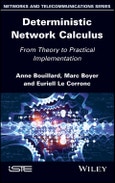Deterministic network calculus is a theory based on the (min,plus) algebra. Its aim is to compute worst-case performance bounds in communication networks. Our goal is to provide a comprehensive view of this theory and its recent advances, from its theoretical foundations to its implementations.
The book is divided into three parts. The first part focuses on the (min,plus) framework and its algorithmic aspects. The second part defines the network calculus model and analyzes one server in isolation. Different service and scheduling policies are discussed, particularly when data is packetized. The third part is about network analyses. Pay burst only once and pay multiplexing only once phenomena are exhibited, and different analyses are proposed and compared. This includes the linear programming approaches that compute tight performance bounds. Finally, some partial results on the stability are detailed.
Table of Contents
1. Basic Model: Single Server, Single Flow.
Part 1. (min,plus) Functions and Algorithms
2. The (min,plus) Functions Semi-ring.
3. Sub-classes of Functions.
4. Efficient Computations for (min,plus) Operators.
Part 2. Network Calculus: Local Analysis
5. Network Calculus Basics: a Server Crossed by a Single Flow.
6. Single Flow Crossing Several Servers.
7. Multiple Flows Crossing One Server.
8. Packets.
9. A Hierarchy of Service Curves.
Part 3. Network Calculus: Global Analysis
10. Modular Analysis: Computing with Curves.
11. Tight Worst-case Performances.
12. Stability in Networks with Cyclic Dependencies.








